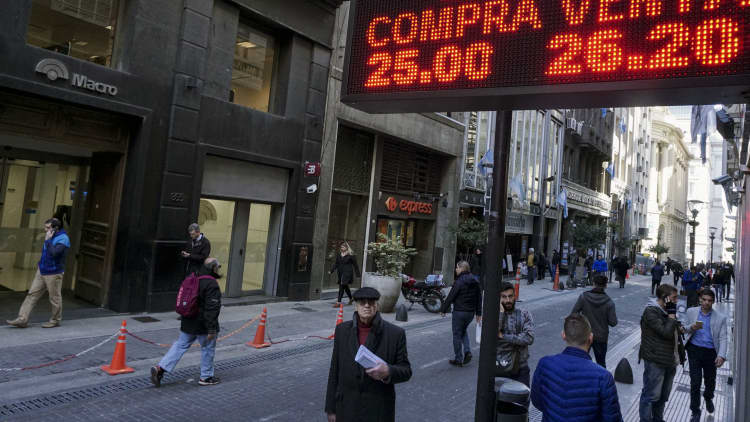
Argentina is grappling with an unprecedented economic crisis, with the country's government taking dramatic steps to try to restore confidence in its free falling currency.
In an effort to shore up its plunging peso, the Central Bank of Argentina moved to raise rates for the fifth time since April on Thursday. But the world's highest benchmark rates have done little to soothe rapidly deteriorating sentiment in Latin America's third-largest economy.
The bank sharply raised interest rates to 60 percent from 45 percent at an unscheduled meeting in the previous session, saying the move was in "response to the foreign exchange rate situation and the risk of greater inflation."
The value of Argentina's peso plunged more than 13 percent on Thursday, following a 7 percent slide a day earlier. This means that since the start of the year, the currency has fallen 51.85 percent against the U.S. dollar.
IMF plea
The South American country's recent flurry of rate hikes had been prompted by a sudden weakening in the peso after a drought hampered farm exports earlier in the year. A spike in energy prices and a resurgent greenback also worsened the situation as investors started to pull funds from emerging markets.
Investors are increasingly concerned Buenos Aires could soon default as it struggles to repay heavy government borrowing. This comes after Argentina's government unexpectedly asked for the early release of a $50 billion loan from the International Monetary Fund (IMF) on Wednesday.
The IMF said in a statement Wednesday that it would look to "revise the government's economic plan with a focus on better insulating Argentina from recent shifts in global financial markets."
The Washington D.C.-based institute also added that its plan included "stronger monetary and fiscal policies and a deepening of efforts to support the most vulnerable in society."
Argentina's anxiety
A number of emerging market countries, including Argentina, Turkey and Brazil, are feeling the impact as tighter monetary policy from the U.S. Federal Reserve has boosted the dollar.
In a televised address on Wednesday, Argentine President Mauricio Macri said: "I know that these tumultuous situations generate anxiety among many of you ... I understand this, and I want you to know I am making all decisions necessary to protect you."
Many people in Argentina blame the IMF for encouraging fiscal policies that escalated the country's worst economic crisis in 2001. At that time, millions of middle-class citizens fell into poverty as the country struggled to recover.
Correction: This story has been updated to reflect that Argentina's peso has fallen 52 percent against the dollar this year.


